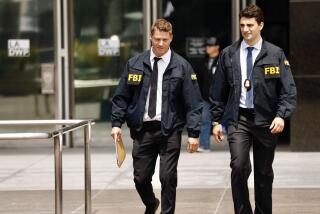Northrop to Pay U.S. $111 Million in TRW Suit
- Share via
In one of the nation’s largest whistle-blower settlements, Northrop Grumman Corp. said Monday that it would pay the federal government $111.2 million to resolve claims that TRW Inc., which it recently acquired, padded bills for defense work done in the early 1990s.
The agreement ends a nine-year legal fight initiated by Richard Bagley, a former chief financial officer for TRW’s Redondo Beach unit. Bagley alleged that TRW overcharged the Pentagon for work on several space electronics programs.
Bagley, who filed a lawsuit in 1994 under the U.S. False Claims Act, will be awarded 24.5% of the total settlement, near the maximum allowed under law to reward employees who report fraud against the government. The act allows whistle-blowers to sue contractors on behalf of the government and share in the recovery.
The U.S. attorney’s office in Los Angeles said Bagley would receive $27.2 million, one of the largest payments to an individual whistle-blower, because of his “extraordinary resolve and tenacity” in pursuing the case.
“It was very unusual to the degree he followed what he believed was right, and as a result we felt he deserved the high reward,” said Susan R. Hershman, the assistant U.S. attorney who handled the case.
Bagley, who now lives in Henderson, Nev., declined to comment. His attorneys said Bagley, 64, had been unable to get a job since being laid off by TRW in 1993 and had been living on a modest pension from the company. “He’s relieved to get this over with,” said Eric Havian, one of Bagley’s attorneys. “Bagley persevered and continued to insist that these claims were valid.”
Century City-based Northrop is the nation’s second-largest defense contractor. Under terms of the settlement, Northrop denied any wrongdoing.
“Our opinion is we didn’t do anything wrong, but it doesn’t mean that the jury won’t find it differently,” said Richard B. Waugh, Northrop’s chief financial officer. “If the government felt they had a cold case, they wouldn’t have settled either.”
The lawsuit had been scheduled to go to trial in November.
The False Claims Act dates to the Civil War and was amended in 1986 to attract more whistle-blowers. In what amounts to a bounty hunter system, individuals can sue on behalf of the government. If the government joins the case, typically a whistle-blower will get from 15% to a maximum 25%; if the whistle-blower goes it alone and wins, the top payout is 30%.
Bagley will get the bulk of the $27.2 million, with his attorneys negotiating separate legal fees with Northrop.
Amid the biggest defense industry buildup in more than a decade, the large payment is likely to spur more whistle-blower lawsuits, attorneys said. There were 320 such suits filed in 2002, up from 310 in 2001 but down from a high of 533 in 1997. About $1 billion was recovered under the statute last year.
“Anytime you see big money, like when someone wins the big lottery, it’s going to make people think about the pot of gold at the end of the rainbow,” said William R. Ramsey, a Valencia attorney who is an expert on whistle-blower cases.
“The idea of the whistle-blower act is quite frankly greed,” he added. “These people are afraid to come forward and fight powerful corporations, so you have to have a lot of greed to overcome that fear.”
The Northrop case resolves one of the longest-running whistle-blower cases. After being laid off as part of a downsizing by TRW, Bagley, a 15-year veteran, filed two lawsuits alleging fraud against the government. The suits were later combined and joined by the Justice Department.
According to the suits, TRW falsely charged the government for costs to develop a proposal to build and operate a satellite-based telephone system, a commercial project that the company later abandoned.
Bagley also alleged that TRW inflated overhead costs for in-house research and development and other costs to develop a “universal spacecraft bus,” a rocket system that delivers satellites into space.
In all, the U.S. claimed that TRW overcharged the government at least $56 million. Northrop, which acquired TRW in December, faced the possibility of damages triple that amount and additional penalties.
“TRW could have settled the case five years ago for about one-quarter of what it ended up paying,” said Michael Bierman, Bagley’s attorney. “Instead, it chose to engage in a drawn-out, losing battle that proved very costly for the company.”
At one point, TRW filed a countersuit alleging that Bagley was a disgruntled employee. A judge dismissed the claim.
At first, the federal government agreed to join in only two of the five claims made by Bagley. But Bagley and his attorneys continued pressing the other charges and eventually provided additional evidence for the Justice Department to begin a probe of the other claims.
“He came to us with a box or two of documents,” Havian said. “Then we ended up getting 400 boxes.”
The drawn-out case also involved the deposition of former NASA Administrator Daniel S. Goldin, who was Bagley’s immediate supervisor at TRW. The lawsuit did not name Goldin but claimed that he approved “mischaracterizing” at least some of the charges to the government.
Goldin was deposed for three days, and he defended his role as manager of the space unit that was at the center of the allegations, saying he did nothing wrong.
The settlement resolves one of four whistle-blower suits against Northrop, totaling nearly $400 million in potential damages.
Northrop has denied the charges and is contesting the cases in court.
Northrop shares closed at $83.50, down $1.90, Monday on the New York Stock Exchange.
More to Read
Inside the business of entertainment
The Wide Shot brings you news, analysis and insights on everything from streaming wars to production — and what it all means for the future.
You may occasionally receive promotional content from the Los Angeles Times.










